
Analysis of Propaganda Decoding Its Effects I Died! 宣传及其效果 aganda and the German Cinema 1933g1945 FOR GEORGE W.BUSH'S RE-ELECTIONI What have You done 主讲教师:王积龙 for our glorious Leader? A MESSAGE FROM THE MINISTRY OF HOMELAND SECURITY
Analysis of Propaganda Decoding & Its Effects 宣传及其效果 主讲教师:王积龙
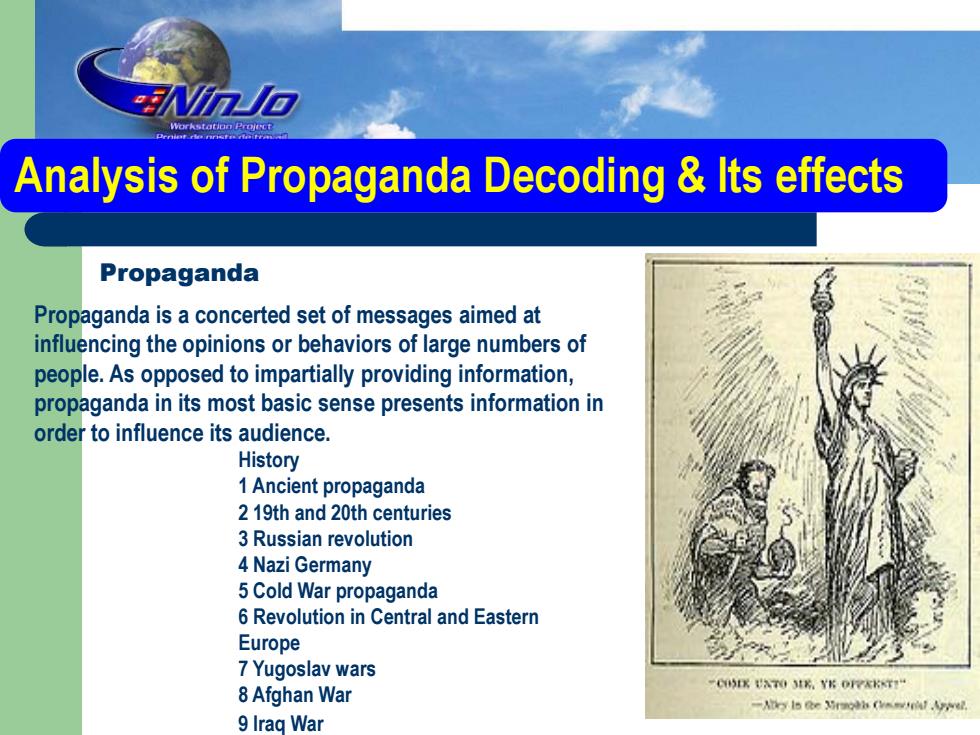
n卮 Analysis of Propaganda Decoding Its effects Propaganda Propaganda is a concerted set of messages aimed at influencing the opinions or behaviors of large numbers of people.As opposed to impartially providing information, propaganda in its most basic sense presents information in order to influence its audience. History 1 Ancient propaganda 219th and 20th centuries 3 Russian revolution 4 Nazi Germany 5 Cold War propaganda 6 Revolution in Central and Eastern Europe 7 Yugoslav wars 8 Afghan War 9703t,Y50xT1 -Atry ls e Mrolis (erif .pre2. 9 Irag War
Propaganda Propaganda is a concerted set of messages aimed at influencing the opinions or behaviors of large numbers of people. As opposed to impartially providing information, propaganda in its most basic sense presents information in order to influence its audience. Analysis of Propaganda Decoding & Its effects History 1 Ancient propaganda 2 19th and 20th centuries 3 Russian revolution 4 Nazi Germany 5 Cold War propaganda 6 Revolution in Central and Eastern Europe 7 Yugoslav wars 8 Afghan War 9 Iraq War
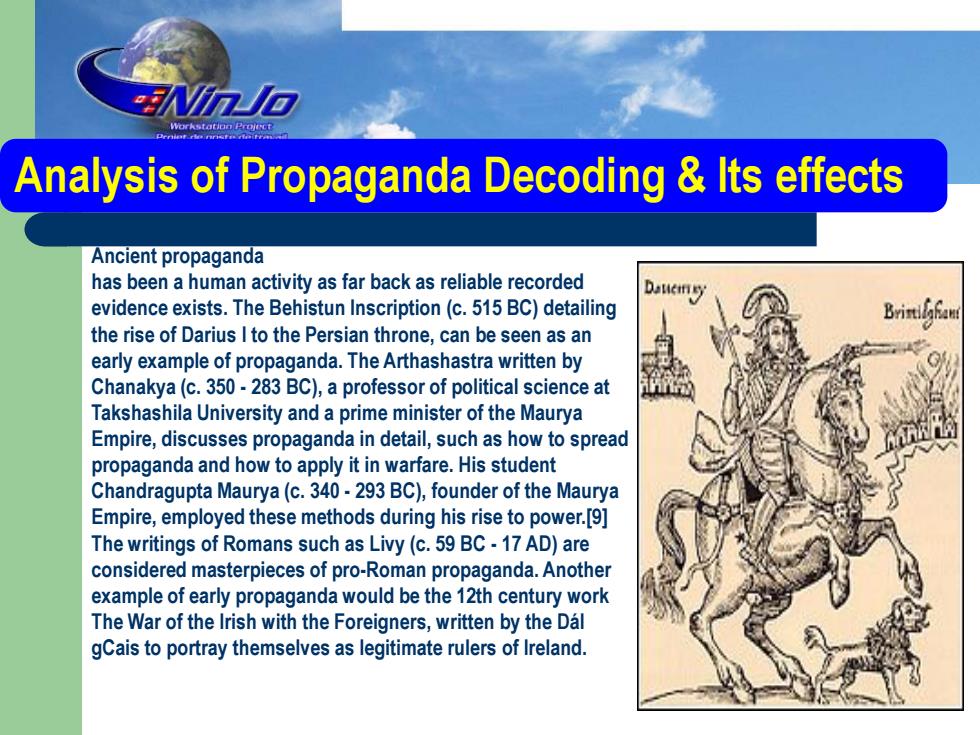
M所na Analysis of Propaganda Decoding Its effects Ancient propaganda has been a human activity as far back as reliable recorded evidence exists.The Behistun Inscription(c.515 BC)detailing Brirtilafa the rise of Darius I to the Persian throne,can be seen as an early example of propaganda.The Arthashastra written by Chanakya(c.350-283 BC),a professor of political science at Takshashila University and a prime minister of the Maurya Empire,discusses propaganda in detail,such as how to spread propaganda and how to apply it in warfare.His student Chandragupta Maurya(c.340-293 BC),founder of the Maurya Empire,employed these methods during his rise to power.[9] The writings of Romans such as Livy(c.59 BC-17 AD)are considered masterpieces of pro-Roman propaganda.Another example of early propaganda would be the 12th century work The War of the Irish with the Foreigners,written by the Dal gCais to portray themselves as legitimate rulers of Ireland
Analysis of Propaganda Decoding & Its effects Ancient propaganda has been a human activity as far back as reliable recorded evidence exists. The Behistun Inscription (c. 515 BC) detailing the rise of Darius I to the Persian throne, can be seen as an early example of propaganda. The Arthashastra written by Chanakya (c. 350 - 283 BC), a professor of political science at Takshashila University and a prime minister of the Maurya Empire, discusses propaganda in detail, such as how to spread propaganda and how to apply it in warfare. His student Chandragupta Maurya (c. 340 - 293 BC), founder of the Maurya Empire, employed these methods during his rise to power.[9] The writings of Romans such as Livy (c. 59 BC - 17 AD) are considered masterpieces of pro-Roman propaganda. Another example of early propaganda would be the 12th century work The War of the Irish with the Foreigners, written by the Dál gCais to portray themselves as legitimate rulers of Ireland
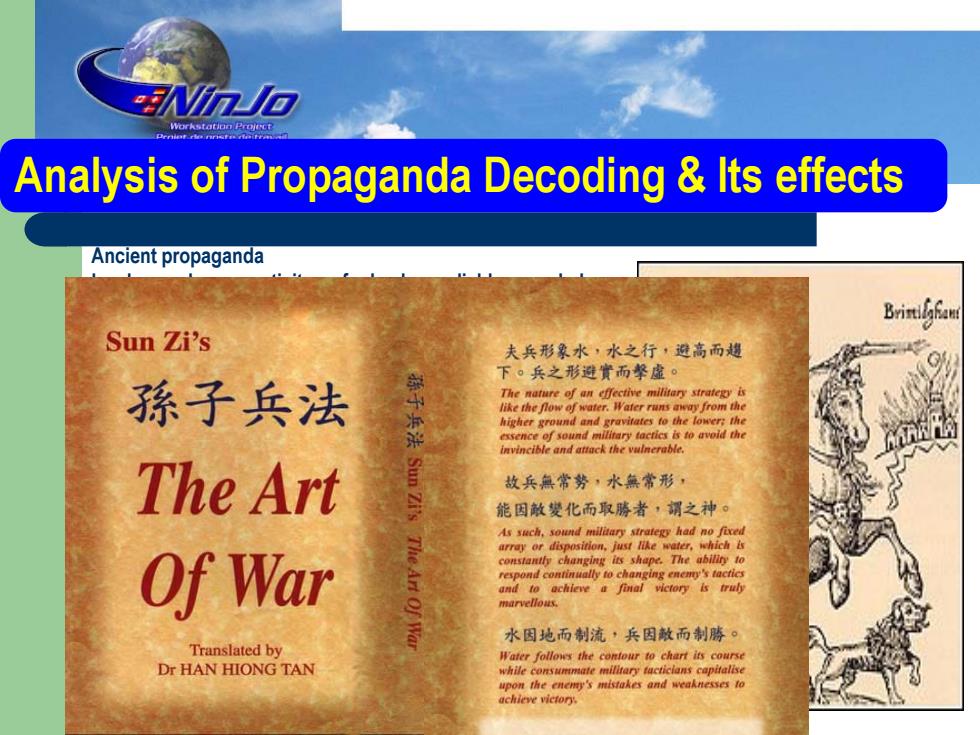
Nna Analysis of Propaganda Decoding Its effects Ancient propaganda Brimtilfan Sun Zi's 夫兵形象水,水之行,近高而趋 下0兵之形避赏而挚虚。 孫子兵法 The nature of an effective military strategy is like the flow of water.Water runs away from the invincible and attack the vulnerable. The Art 故兵無常势,水無常形 能因敏變化而取膀者,谓之神。 As such,sound military strategy had no fixed array or disposition.just like water,which is Of War constantly changing在shape.The abiliry同 epononaochansngama2i。 and to achieve a final victory is truly 水因地而制流,兵因敏而制膝。 Translated by Dr HAN HIONG TAN upon the enemy's mistakes and weaknesses to achieve victory
Analysis of Propaganda Decoding & Its effects Ancient propaganda has been a human activity as far back as reliable recorded evidence exists. The Behistun Inscription (c. 515 BC) detailing the rise of Darius I to the Persian throne, can be seen as an early example of propaganda. The Arthashastra written by Chanakya (c. 350 - 283 BC), a professor of political science at Takshashila University and a prime minister of the Maurya Empire, discusses propaganda in detail, such as how to spread propaganda and how to apply it in warfare. His student Chandragupta Maurya (c. 340 - 293 BC), founder of the Maurya Empire, employed these methods during his rise to power.[9] The writings of Romans such as Livy (c. 59 BC - 17 AD) are considered masterpieces of pro-Roman propaganda. Another example of early propaganda would be the 12th century work The War of the Irish with the Foreigners, written by the Dál gCais to portray themselves as legitimate rulers of Ireland
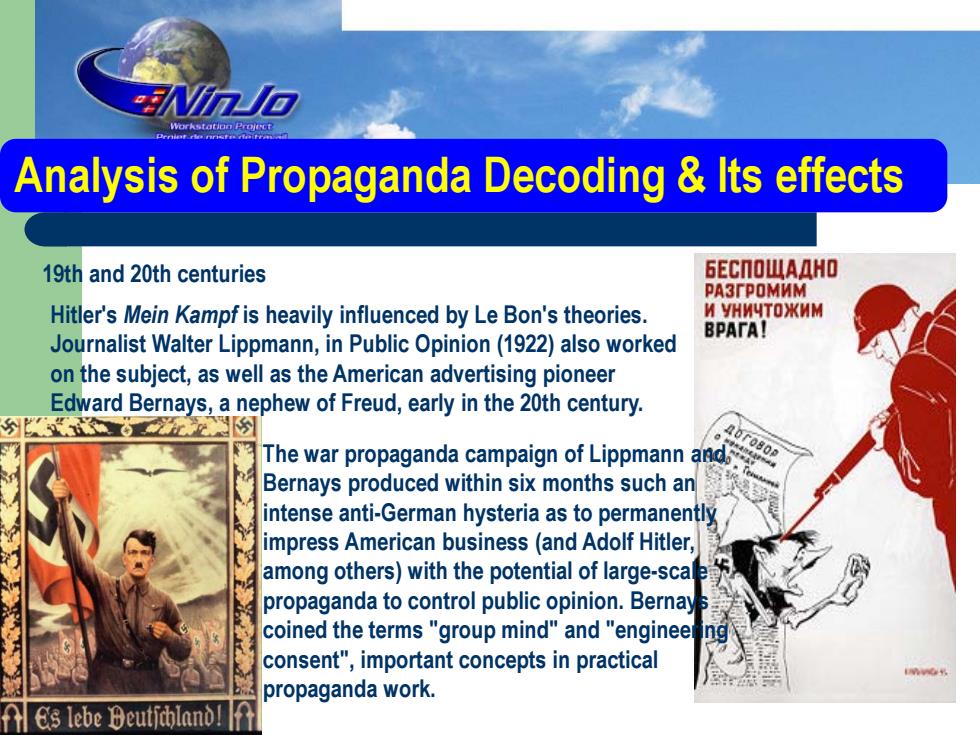
罗M所n石 Analysis of Propaganda Decoding Its effects 19th and 20th centuries 6ECNOWAAHO PA3rPOMNM Hitler's Mein Kampf is heavily influenced by Le Bon's theories. W YHWYTOXHM BPArA! Journalist Walter Lippmann,in Public Opinion(1922)also worked on the subject,as well as the American advertising pioneer Edward Bernays,a nephew of Freud,early in the 20th century. A0r080 The war propaganda campaign of Lippmann and Bernays produced within six months such an intense anti-German hysteria as to permanently impress American business(and Adolf Hitler, among others)with the potential of large-sca propaganda to control public opinion.Bernay coined the terms "group mind"and "enginee consent",important concepts in practical propaganda work. Es lebe Deutjchlan
Analysis of Propaganda Decoding & Its effects 19th and 20th centuries Hitler's Mein Kampf is heavily influenced by Le Bon's theories. Journalist Walter Lippmann, in Public Opinion (1922) also worked on the subject, as well as the American advertising pioneer Edward Bernays, a nephew of Freud, early in the 20th century. The war propaganda campaign of Lippmann and Bernays produced within six months such an intense anti-German hysteria as to permanently impress American business (and Adolf Hitler, among others) with the potential of large-scale propaganda to control public opinion. Bernays coined the terms "group mind" and "engineering consent", important concepts in practical propaganda work
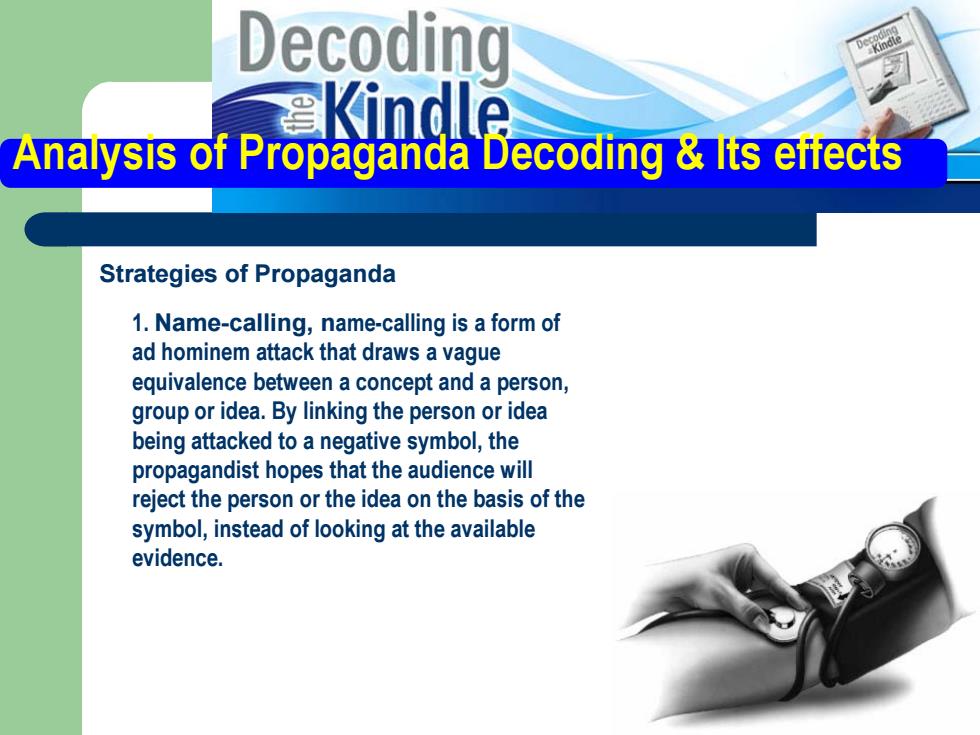
Decodino Kindle Analysis of Propaganda Decoding Its effects Strategies of Propaganda 1.Name-calling,name-calling is a form of ad hominem attack that draws a vague equivalence between a concept and a person, group or idea.By linking the person or idea being attacked to a negative symbol,the propagandist hopes that the audience will reject the person or the idea on the basis of the symbol,instead of looking at the available evidence
Strategies of Propaganda Analysis of Propaganda Decoding & Its effects 1. Name-calling, name-calling is a form of ad hominem attack that draws a vague equivalence between a concept and a person, group or idea. By linking the person or idea being attacked to a negative symbol, the propagandist hopes that the audience will reject the person or the idea on the basis of the symbol, instead of looking at the available evidence
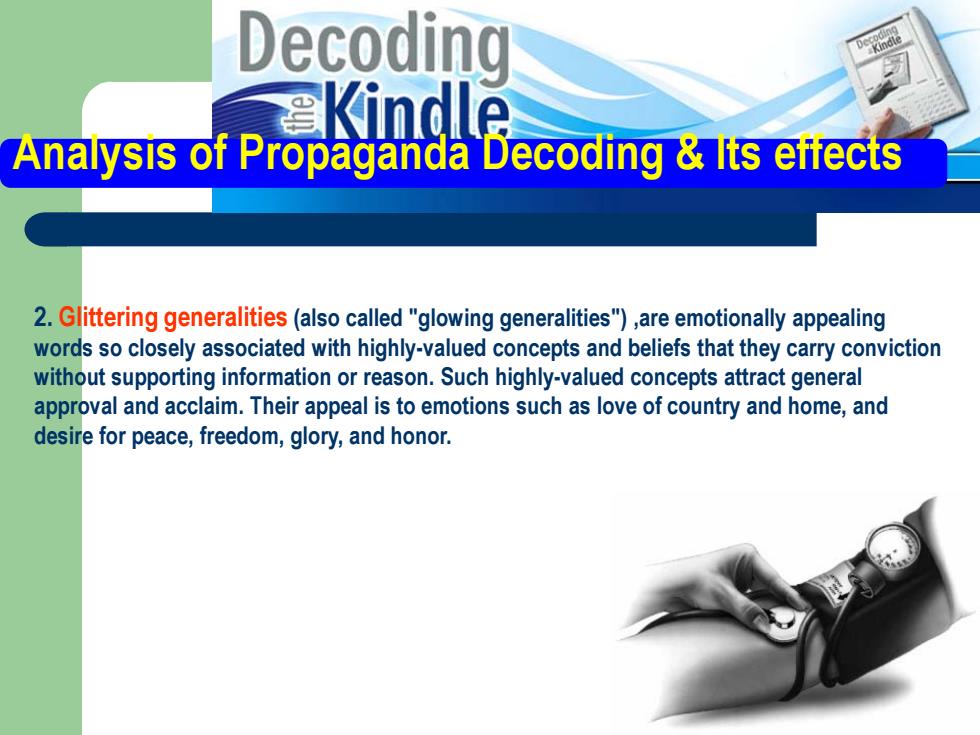
Decoding Kindle Analysis of Propaganda Decoding Its effects 2.Glittering generalities (also called"glowing generalities"),are emotionally appealing words so closely associated with highly-valued concepts and beliefs that they carry conviction without supporting information or reason.Such highly-valued concepts attract general approval and acclaim.Their appeal is to emotions such as love of country and home,and desire for peace,freedom,glory,and honor
2. Glittering generalities (also called "glowing generalities") ,are emotionally appealing words so closely associated with highly-valued concepts and beliefs that they carry conviction without supporting information or reason. Such highly-valued concepts attract general approval and acclaim. Their appeal is to emotions such as love of country and home, and desire for peace, freedom, glory, and honor. Analysis of Propaganda Decoding & Its effects

Decodino Kindle Analysis of Propaganda Decoding Its effects 2.Glittering generalities Their appeal is to emotions such as love of country and home,and desire for peace,freedom,glory,and honor.They ask for approval without examination of the reason.They are typically used by politicians and propagandists. SIR,ANOTHER CAR BOMB HAS EXPLODED-· AND DID IT THEN PROCEED TO SHOWER ER--NO, OUR WITH A GENTLE CLOUD oF SIR,IT ROSE PETALS MAYHAP? DID NOT-- Do NOT WISH TO WITH SUCH TRIFLES!
2. Glittering generalities Analysis of Propaganda Decoding & Its effects Their appeal is to emotions such as love of country and home, and desire for peace, freedom, glory, and honor. They ask for approval without examination of the reason. They are typically used by politicians and propagandists
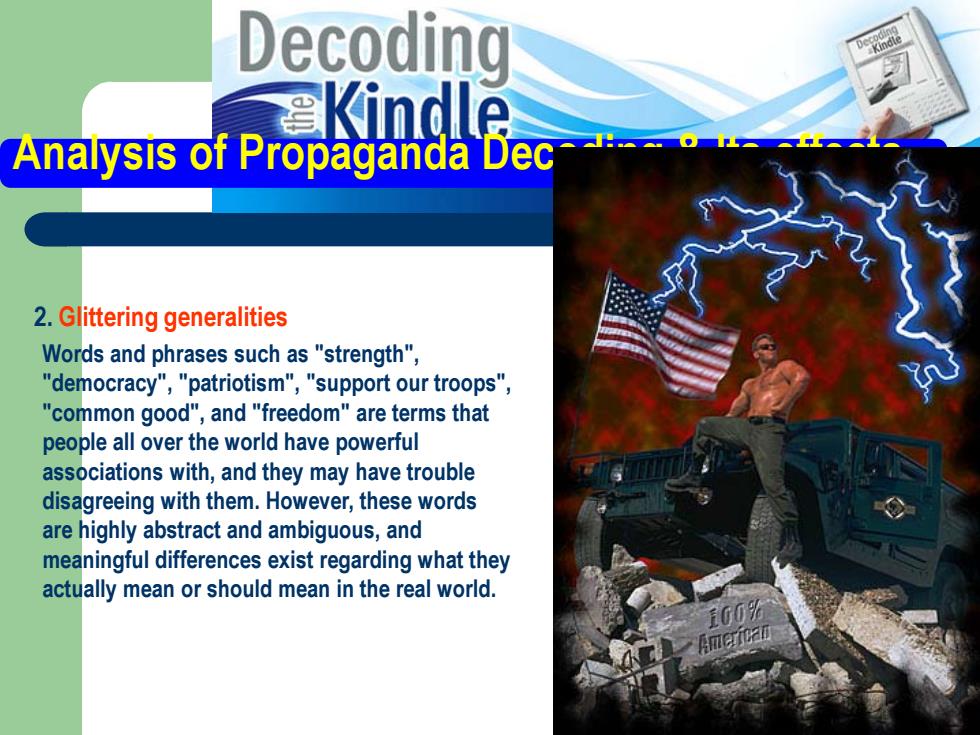
Decoding Kindle Analysis of Propaganda Dec 2.Glittering generalities Words and phrases such as"strength", "democracy","patriotism","support our troops", "common good",and "freedom"are terms that people all over the world have powerful associations with,and they may have trouble disagreeing with them.However,these words are highly abstract and ambiguous,and meaningful differences exist regarding what they actually mean or should mean in the real world. 006 和I
2. Glittering generalities Analysis of Propaganda Decoding & Its effects Words and phrases such as "strength", "democracy", "patriotism", "support our troops", "common good", and "freedom" are terms that people all over the world have powerful associations with, and they may have trouble disagreeing with them. However, these words are highly abstract and ambiguous, and meaningful differences exist regarding what they actually mean or should mean in the real world
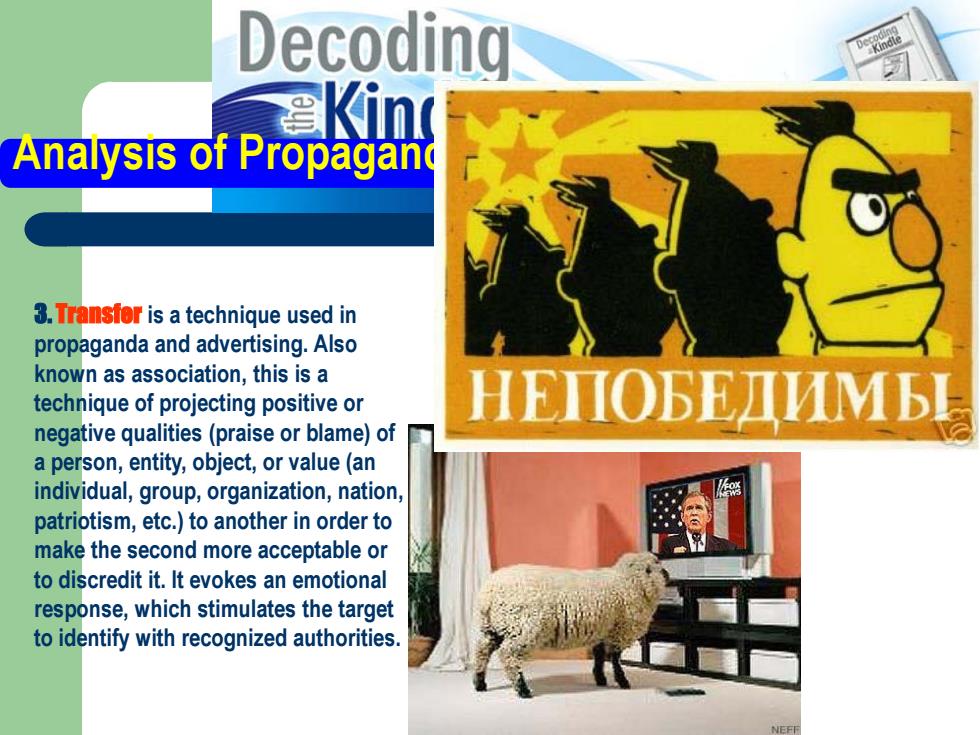
Decoding Kin Analysis of Propagan 3.Transfor is a technique used in propaganda and advertising.Also known as association,this is a technique of projecting positive or HEIOBEMB! negative qualities(praise or blame)of a person,entity,object,or value (an individual,group,organization,nation, patriotism,etc.)to another in order to make the second more acceptable or to discredit it.It evokes an emotional response,which stimulates the target to identify with recognized authorities
3. Transfer is a technique used in propaganda and advertising. Also known as association, this is a technique of projecting positive or negative qualities (praise or blame) of a person, entity, object, or value (an individual, group, organization, nation, patriotism, etc.) to another in order to make the second more acceptable or to discredit it. It evokes an emotional response, which stimulates the target to identify with recognized authorities. Analysis of Propaganda Decoding & Its effects